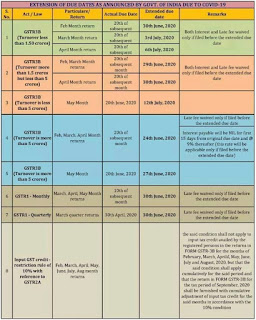AMENDMENTS IN CGST RULES
Other than extension of dates for
GST returns, some important amendments to CGST Rules 2017 have been covered as
follows:
1. Registration: In an
attempt to centralize data of an entity on records with government Authentication
of Aadhar Number is mandatory while obtaining GST Registration
filing from 1st April 2020. In cases, if the applicant does not have PAN Number
in such cases, the application can be accepted only on physical verification at
the principal place of business in the presence of the applicant within 60 days
from the date of filing of the application. However, Aadhar authentication for
the obtaining GST registration from 1st April 2020 does not apply to a person
who is not a citizen of India and to any other class of persons not mentioned
below:
1. Individual
2. Authorized
Signatory of all types
3. Managing and
Authorized Partner
4. Karta of a
Hindu Undivided Family
2. Physical Verification in
Certain cases: In order to correct cases of fake invoicing on
addresses which are not in existence, if the officer feels that physical
verification is required for the principal place of business for any other
reason or the applicant does not have the PAN Number, the verification report
along with the photographs and other documents has to be uploaded on the common
portal within 15 days of such physical verification using the Form GST REG –
30.
3. Input Tax Credit on Capital
Goods: The life of capital goods for the GST purposes is considered to be
five years from the date of invoice, and the amount of tax shown on the tax
invoice will be reflected in the input tax credit ledger. The input tax credit
claimed has to be reversed at the rate of 5% per quarter is the capital
goods are used for other than taxable supplies. The tax to be reversed has to
be computed separately for each tax and reported in GSTR – 3B.
4. GST Audit Threshold Limit
for FY 2018-19: The GST Audit threshold for the financial year 2018-19 has
been increased to Rs 5 crores in order to reduce the compliance burden
on small retailers, traders, shop keepers who comprise the Medium, Small and
Micro Enterprise (MSME) sector, the Union Budget proposed to raise by five
times the turnover threshold for audit from the existing Rs. 1 crore to Rs. 5
crore.
5. Refund of excess payment of
Taxes: If the registered taxpayer has claimed refund of the taxes paid in
excess or paid wrongly in different heads, for which debit has been made from
the electronic credit ledger, earlier, after inspection by GST authorities, refund
amount was credited to the applicant bank account which lead to many
fraudulent cases seeking cash against credit wrongly taken, which later even if
government comes to know about can’t be corrected and even liquidity was lost . Currently government has kept on hold such refunds where they had doubt and asked assessees to show documents to verify and justify their claim. To check this, now refund amount shall be re-credited to the electronic credit
ledger by the proper officer through FORM GST PMT-03.
6. Zero Rated Supplies:
Turnover for Zero Rated Supply has been defined, and it means the value of
zero-rated supplies made during a relevant tax period under letter of credit or
bond or the value which is 1.5 time of the value of like goods domestically
supplied by the same or, similarly placed, supplies as declared by the supplier
whichever is lesser. The change is made to ensure that undue excessive refund
on itc calculated by the formula using turnover for Zero rated supply is not
made by the assessee.
7. Recovery of Refund: GST
Law regarding refund for export of goods or services or both was not in line
with FEMA Foreign Exchange Management Act ,1999 where time limit for realizing
export proceeds were specified. Taking advantage of this loophole, many
exporters made money by seeking refund against fake shipping bills and export
documents. In order to correct this practice, the taxpayers who have claimed a
refund for export of goods or services or both have not realized the value of
the goods or services exported based on the time limit prescribed under Foreign
Exchange Management Act 1999, the amount of refund claimed has to be paid with
interest for the pro-rated amount which is not realized. The amount has to be
remitted within 30 days of the expiry of the time period prescribed else the
recovery proceedings will be initiated under Section 73 or Section 74 of the
CGST Act 2107. Where the sale proceeds have been written off by the Reserve
Bank of India, in such cases, no recovery will be made. The amount of refund
recovered from the taxpayer for non-realization will be refunded back if the
exporter pays back the amount. The amount will be refunded if the exporter
claims the same within three months from the date of remittance along with
valid proofs.




Comments
Post a Comment